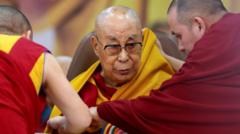Robert Francis Prevost has been elected as the first American pope, taking the name Leo XIV. In his inaugural address to a crowd in St. Peter’s Square, he emphasized peace and the importance of building bridges among diverse communities. With a background of service in both the U.S. and Peru, he is poised to continue the inclusive legacy of Pope Francis while addressing pressing global issues.
First American Pope Pope Leo XIV Calls for Unity and Peace in Historic Address

First American Pope Pope Leo XIV Calls for Unity and Peace in Historic Address
The election of Robert Francis Prevost as Pope Leo XIV marks a historic moment for the Catholic Church, emphasizing a vision for global unity and social justice.
Pope Leo XIV, born Robert Francis Prevost in Chicago, has made history as the first American pope after being elected by the College of Cardinals during a conclave that lasted just over 24 hours. The announcement, heralded by the appearance of white smoke from the Sistine Chapel chimney, drew cheers from thousands gathered in St. Peter’s Square, showcasing a mix of jubilation and astonishment at the groundbreaking choice.
In his first public address, the newly elected pontiff emphasized a commitment to peace, unity, and inclusivity within the global Catholic community of 1.4 billion members. He proclaimed, “We must seek together how to be a missionary church, a church that builds bridges,” resonating deeply with attendees, many of whom waved American flags in support of their new leader.
Pope Leo XIV's election is particularly significant as it breaks the traditional mold of papal election, challenging the assumption that leaders of global faith would shy away from choosing a pope from a prominent world superpower. His unique journey includes extensive service in Peru, where he held the position of bishop prior to his elevation to cardinal by Pope Francis. This background positions him as a conciliatory figure capable of bridging ideological divides within the Church.
The new pope’s choice to take on the name Leo XIV, drawing a connection to the social justice teachings of previous popes, suggests an ongoing priority for addressing socio-economic issues. Leo emphasized the need to be a church attentive to the marginalized, echoing the commitment to social teachings that characterized Pope Francis' tenure.
Responses to this historic election came from around the world. Leaders, including U.S. President Biden and former President Trump, extended their congratulations, reflecting a recognition of the symbolic importance of an American leading a global religious institution amid complex geopolitical landscapes. Many American Catholics, including those from the pope's hometown of Chicago, expressed a sense of pride and solidarity, viewing his election not only as a personal victory but as a positive reflection of broader American values in a time of division.
As reactions unfold, the broader implications of Pope Leo XIV’s leadership style and decision-making remain to be seen. His first public statements portray a willingness to engage with pressing global crises, including climate change and social inequality, areas that resonate significantly within today's Church and global society. The 69-year-old pope is expected to prioritize dialogue and inclusivity while navigating the diverse views within his vast congregation.
In a world grappling with tension and uncertainty, Leo XIV's call for peace and unity is both timely and poignant, embodying a desire for a renewed vision within the Catholic Church and beyond.



















